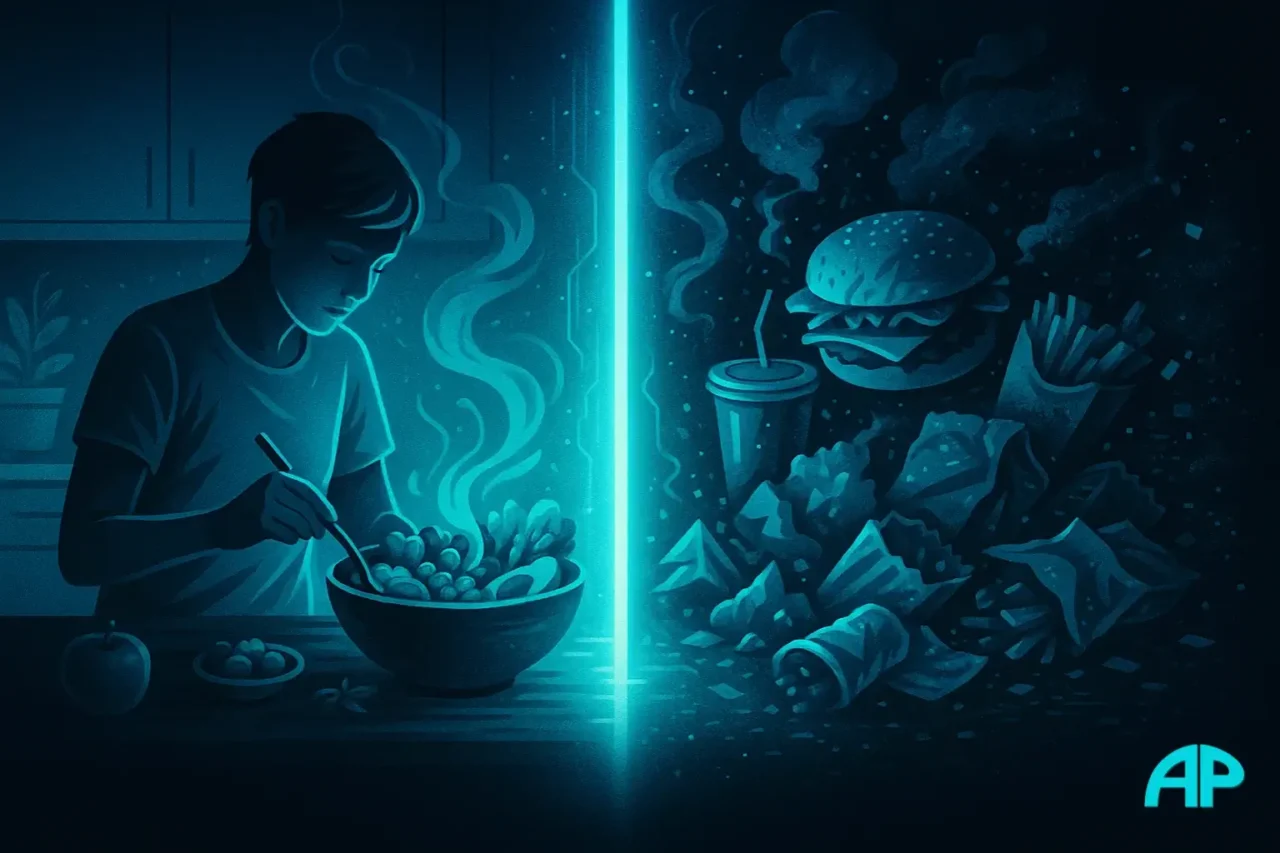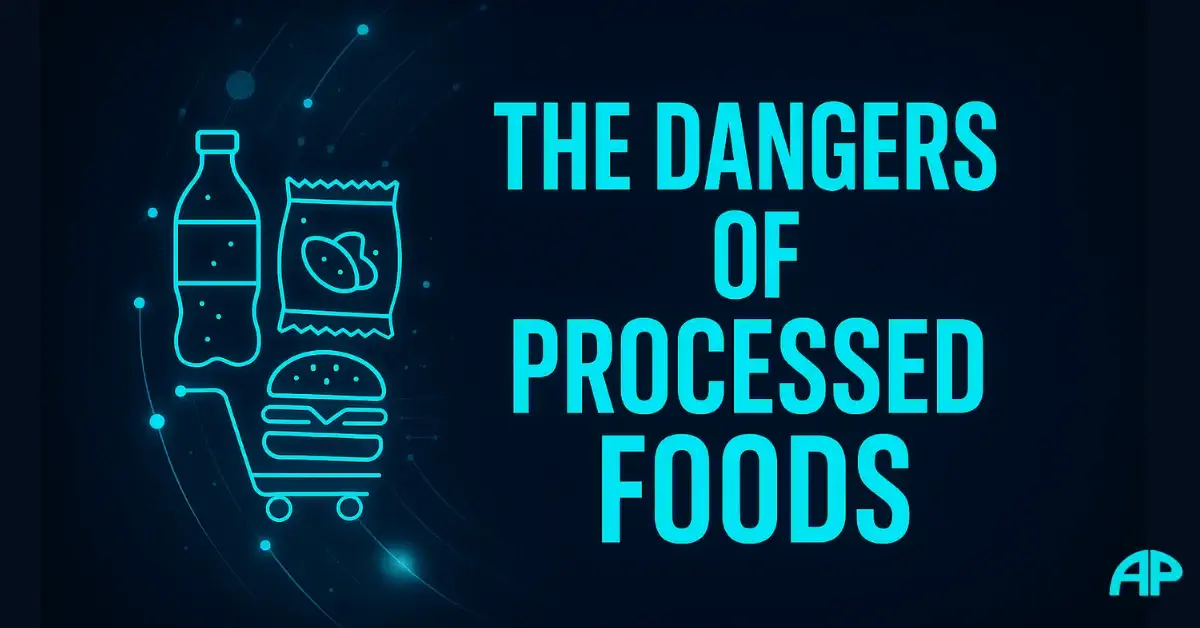Discover the hidden risks of processed foods and how to protect your body with real nutrition.
We all say we want to eat better and live better, yet most of what fills supermarket shelves hides the dangers of processed foods behind colourful packaging and “healthy” claims. These fake foods have quietly taken over modern diets and are now a major cause of obesity, fatigue, gut issues, and poor mental health. From chemical additives to lab-made ingredients, processed foods are doing far more harm than most people realise. In this post, we’ll uncover the dangers of processed foods, explain how they sabotage your health and mindset, and show you how to build healthy eating habits around real, whole foods that help you avoid junk food, improve your nutrition, and take back control of your energy and wellbeing.
Table of Contents
- Understanding the Dangers
of Processed Foods - The Psychological Hook
Behind Junk Food Cravings - Healthy Eating Habits That
Fight the Dangers of Foods - The Power of a Whole Foods
Diet for Better Living - How to Improve Your
Nutrition Every Day - Frequently Asked Questions
- Final Thoughts on Avoiding
Processed Foods
Understanding the Dangers of Processed Foods
We live in a world where “food” often comes wrapped in shiny plastic and lasts longer than it should. Processed foods promise convenience, flavor, and affordability but at a cost. Somewhere along the way, we traded real nutrition for chemicals that mimic it.
Most people don’t realize just how deep this trap goes. When you walk through a supermarket, more than 70% of what’s on the shelves has been altered, preserved, or refined. The labels may scream “low fat,” “sugar-free,” or “plant-based,” but what you’re really eating is a science experiment. To truly protect yourself from the dangers of processed foods, it helps to understand how these modern creations are slowly destroying your health and energy.
The Psychological Hook Behind Junk Food Cravings
Ever wondered why it’s easier to demolish a bag of chips than to finish a salad? That’s not a lack of willpower; it’s biology.
Food companies spend billions designing junk food that hijacks your brain. Every crunch, color, and chemical compound is carefully tested to trigger dopamine, the same “reward” chemical that drives addiction.
Over time, your brain associates stress, boredom, or sadness with the promise of comfort food. The result? You crave more of what’s killing you. Breaking this cycle starts with awareness. When you avoid junk food, you begin to break the emotional bond that keeps you stuck in the loop.
True healthy eating habits aren’t about punishment; they’re about liberation. When you free yourself from engineered cravings, food becomes fuel again, not a coping mechanism.
Healthy Eating Habits That Fight the Dangers of Processed Foods

Here’s the truth: most people fail at healthy eating because they try to do too much too fast. You don’t need to throw out your entire pantry overnight. Start small.
- Swap one processed snack for a piece of fruit or nuts.
- Replace sugary drinks with water or herbal tea.
- Cook one more meal per week from scratch.
These small shifts build consistency and help you break free from the dangers of processed foods while improving your nutrition naturally. Over time, your energy returns, your focus sharpens, and your cravings fade.
To truly take control, build meals around real ingredients like fresh vegetables, lean proteins, and whole grains. When you focus on what adds value to your body, you naturally crowd out what doesn’t.
The Power of a Whole Foods Diet for Better Living
A whole foods diet is the simplest way to reclaim your health. It’s not a trend; it’s how humans were designed to eat. Whole foods deliver vitamins, minerals, and enzymes that your body recognizes and can use immediately.
When you make the switch, your body responds fast. Within weeks, inflammation drops, digestion improves, and sleep becomes deeper. You’ll feel lighter, both physically and mentally.
The beauty of a whole foods diet is that it doesn’t require calorie counting or fancy supplements. Just eat food as close to its natural state as possible. If it grew in the ground, grazed on grass, or swam in the sea, it’s probably good for you.
As you improve your nutrition, your body begins to heal itself. This isn’t a diet; it’s a lifestyle built on awareness and intention.
How to Improve Your Nutrition and Eat Better Every Day
Eating well isn’t about being perfect; it’s about being consistent. Life gets busy, and sometimes convenience wins, but your long-term habits are what define your health.
Set yourself up for success by building an environment that supports your goals:
- Keep healthy snacks visible and accessible.
- Avoid keeping junk food in the house.
- Meal-prep when you can.
- Choose restaurants that serve fresh food.
When you take control of your environment, you naturally make better choices. Remember, the goal isn’t just to live longer; it’s to live better.
By understanding the dangers of processed foods, adopting healthy eating habits, and embracing a whole foods diet, you give yourself the foundation for lasting health, energy, and clarity.
Frequently Asked Questions
Q1: What’s the difference between processed and ultra-processed foods?
Processed foods are altered slightly for preservation, like frozen veggies. Ultra-processed foods are chemically modified with artificial flavors, colors, and preservatives—these are the ones to limit.
Q2: How can I start eating healthier on a budget?
Focus on seasonal produce, bulk whole grains, and local markets. Cooking from scratch is cheaper than constant takeout.
Q3: Is it okay to eat processed foods occasionally?
Yes, moderation matters. The goal is awareness, not obsession. Aim for 80% whole foods and 20% flexibility.
Q4: What are the best snacks for avoiding junk food?
Try fruit, nuts, boiled eggs, or hummus with veggie sticks. They satisfy cravings without additives.
Q5: How long before I feel the benefits of a whole-food diet?
Most people notice changes within two to three weeks—more energy, clearer skin, better mood, and improved digestion.
Final Thoughts on Avoiding the Dangers of Processed Foods
If you want to take control of your health, start by recognizing the dangers of processed foods. They promise comfort and convenience but steal your vitality. Shift your focus back to real food—what nature made, not what factories invented.
Because at the end of the day, the more you respect what you put into your body, the more your body will respect you back.


